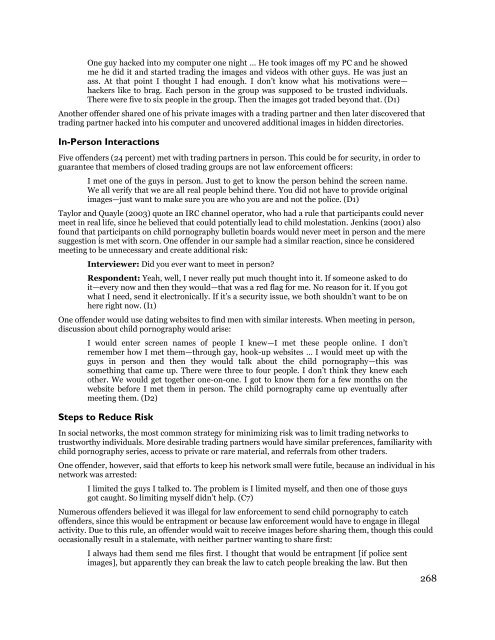413047-Underground-Commercial-Sex-Economy
413047-Underground-Commercial-Sex-Economy
413047-Underground-Commercial-Sex-Economy
You also want an ePaper? Increase the reach of your titles
YUMPU automatically turns print PDFs into web optimized ePapers that Google loves.
One guy hacked into my computer one night … He took images off my PC and he showed<br />
me he did it and started trading the images and videos with other guys. He was just an<br />
ass. At that point I thought I had enough. I don’t know what his motivations were—<br />
hackers like to brag. Each person in the group was supposed to be trusted individuals.<br />
There were five to six people in the group. Then the images got traded beyond that. (D1)<br />
Another offender shared one of his private images with a trading partner and then later discovered that<br />
trading partner hacked into his computer and uncovered additional images in hidden directories.<br />
In-Person Interactions<br />
Five offenders (24 percent) met with trading partners in person. This could be for security, in order to<br />
guarantee that members of closed trading groups are not law enforcement officers:<br />
I met one of the guys in person. Just to get to know the person behind the screen name.<br />
We all verify that we are all real people behind there. You did not have to provide original<br />
images—just want to make sure you are who you are and not the police. (D1)<br />
Taylor and Quayle (2003) quote an IRC channel operator, who had a rule that participants could never<br />
meet in real life, since he believed that could potentially lead to child molestation. Jenkins (2001) also<br />
found that participants on child pornography bulletin boards would never meet in person and the mere<br />
suggestion is met with scorn. One offender in our sample had a similar reaction, since he considered<br />
meeting to be unnecessary and create additional risk:<br />
Interviewer: Did you ever want to meet in person<br />
Respondent: Yeah, well, I never really put much thought into it. If someone asked to do<br />
it—every now and then they would—that was a red flag for me. No reason for it. If you got<br />
what I need, send it electronically. If it’s a security issue, we both shouldn’t want to be on<br />
here right now. (I1)<br />
One offender would use dating websites to find men with similar interests. When meeting in person,<br />
discussion about child pornography would arise:<br />
I would enter screen names of people I knew—I met these people online. I don’t<br />
remember how I met them—through gay, hook-up websites … I would meet up with the<br />
guys in person and then they would talk about the child pornography—this was<br />
something that came up. There were three to four people. I don’t think they knew each<br />
other. We would get together one-on-one. I got to know them for a few months on the<br />
website before I met them in person. The child pornography came up eventually after<br />
meeting them. (D2)<br />
Steps to Reduce Risk<br />
In social networks, the most common strategy for minimizing risk was to limit trading networks to<br />
trustworthy individuals. More desirable trading partners would have similar preferences, familiarity with<br />
child pornography series, access to private or rare material, and referrals from other traders.<br />
One offender, however, said that efforts to keep his network small were futile, because an individual in his<br />
network was arrested:<br />
I limited the guys I talked to. The problem is I limited myself, and then one of those guys<br />
got caught. So limiting myself didn’t help. (C7)<br />
Numerous offenders believed it was illegal for law enforcement to send child pornography to catch<br />
offenders, since this would be entrapment or because law enforcement would have to engage in illegal<br />
activity. Due to this rule, an offender would wait to receive images before sharing them, though this could<br />
occasionally result in a stalemate, with neither partner wanting to share first:<br />
I always had them send me files first. I thought that would be entrapment [if police sent<br />
images], but apparently they can break the law to catch people breaking the law. But then<br />
268


